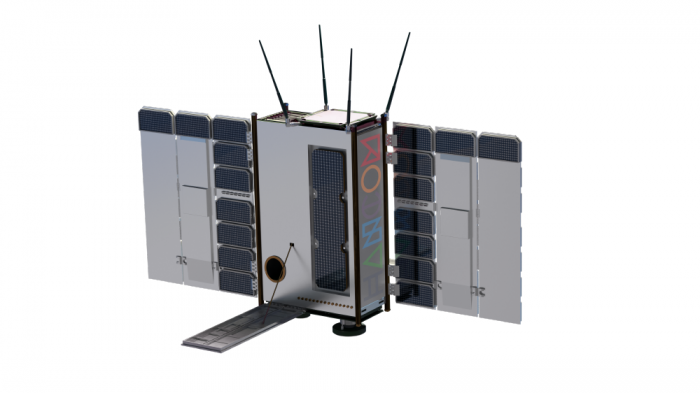Aerospace & Defense
Hancom to launch South Korea’s first private satellite
The historic launch of Sejong-1 is scheduled for May 25 at Kennedy Space Center in Florida
By May 18, 2022 (Gmt+09:00)
2
Min read
Most Read
LG Chem to sell water filter business to Glenwood PE for $692 million


Kyobo Life poised to buy Japan’s SBI Group-owned savings bank


KT&G eyes overseas M&A after rejecting activist fund's offer


StockX in merger talks with Naver’s online reseller Kream


Mirae Asset to be named Korea Post’s core real estate fund operator



Hancom InSpace, an affiliate of Hancom Group, announced on Wednesday it will launch South Korea’s first private satellite for Earth observation.
The company has been working with US space satellite data firm Spire Global in this endeavor. If realized, Hancom will be the first non-government entity from South Korea to put a satellite weighing less than 100 kg into space.
On May 25, according to the local Eastern Daylight Time, Hancom will launch Sejong-1 from the Kennedy Space Center in Cape Canaveral, Florida.
The initial launch date was teased as June 1 but it has been hastened due to meteorological reasons.
For the projectile, Sejong-1 will be equipped with Elon Musk-owned SpaceX’s Falcon 9.
Hancom successfully completed testing of its first satellite's mount linkage and more in the UK last month.
The Sejong-1 is a low earth orbit CubeSat with 20 cm in width, 10 cm in length and 30 cm in height. It only weighs 10.8 kg.
It will orbit the Earth 12 to 14 times a day, completing an orbit every 90 minutes. Its mission is to collect image data of seven wavelengths using a 5m-resolution observation camera.

The group plans to launch four more single satellites in the Sejong-series. It also anticipates launching and operating cluster satellites – more than 50 satellites per cluster.
Sejong-2 is slated for launch in the early half of next year; with 3 and 4 in the latter half.
Hancom Group chose Asia and the Middle East as its target business areas. The logic is that the demand for satellite imagery is high in countries either with heavy reliance on the agricultural business or that are in constant military conflict.
A week ago, the Ministry of Science and ICT selected Hancom InSpace as the lead company to be in charge of the private sector’s development of small-sized communication satellite systems for 6G low-orbital communications, as part of Seoul’s space innovation initiative.
"The satellite imagery data service market has been growing rapidly in recent years,” Choi Myung-jin, CEO of Hancom InSpace said. “The company will lead South Korea’s ‘New Space’ era by utilizing its experience of running a terrestrial station for satellites since 2012 and its data processing and AI-fueled analysis know-how.”
Write to Han-Gyeol Seon at always@hankyung.com
Jee Abbey Lee edited this article.
More to Read
-
 Bio & PharmaBoryung takes 'health is wealth' to whole new level – space
Bio & PharmaBoryung takes 'health is wealth' to whole new level – spaceApr 20, 2022 (Gmt+09:00)
1 Min read -
 Aerospace & DefenseKorea’s Hanwha Aerospace to develop small rocket system
Aerospace & DefenseKorea’s Hanwha Aerospace to develop small rocket systemDec 06, 2021 (Gmt+09:00)
1 Min read -
 Aerospace & DefenseSoftware giant Hancom joins space race with satellite launch
Aerospace & DefenseSoftware giant Hancom joins space race with satellite launchSep 02, 2021 (Gmt+09:00)
2 Min read
Comment 0
LOG IN


